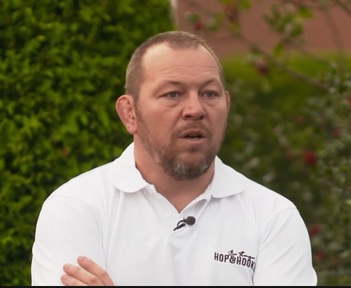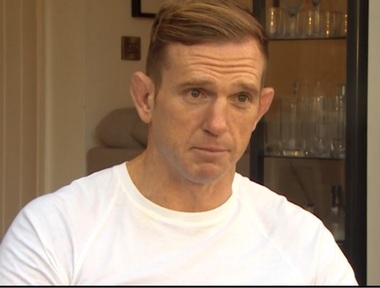Rugby stars diagnosed with early onset dementia launch landmark legal action
England Rugby World Cup star, Steve Thompson, who has been diagnosed with early onset dementia at the age of 42, is joining a group of former rugby players in a landmark legal action against World Rugby to make the game safer.

The players under the age of 45 have been diagnosed with dementia and are planning to launch a legal action against the governing body for alleged failure to protect them from the risks caused by suspected concussive and sub-concussive injuries. They want to see a serious reform of contact in the sport both on and off the pitch.
All the players have been given a diagnosis of dementia with probable chronic traumatic encephalopathy (CTE).
Chronic traumatic encephalopathy (CTE) is a progressive brain condition that is thought to be caused by repeated blows to the head and repeated episodes of concussion.
The symptoms of CTE vary between individuals but tend to be similar to those of other types of degenerative brain conditions, particularly Alzheimer's disease. CTE usually begins gradually several years after receiving repetitive blows to the head or repeated concussions.
'I can’t remember any of the games whatsoever'
Steve Thompson, former Northampton Saints and England hooker was part of the England 2003 team which went on to win the Rugby World Cup in 2003 in Australia.
Seventeen years on, Mr Thompson struggles to remember his winning victory and what should have been “such a big thing” in his life, is “just not there.”
Mr Thompson told the BBC: “I cannot remember being in Australia at all. I can’t remember the whole situation of the World Cup.” Mr Thompson sat down to watch the World Cup back. It was like watching a game [with] England playing, I could see me there, but I wasn’t there because it’s not me. It’s just bizarre."
Since the World Cup, Mr Thompson has spoken to the other players who were there in Australia. “You pick up stories and can talk about it but It’s not me being there. I can’t remember any of the games whatsoever."
Mr Thompson says he feels “frightened” when he watches those games. “It’s worrying when that is meant to be such a big thing in my life and it’s just not there.”
Mr Thompson has spoken to a specialist who told him: "The best way to describe it is you are a camera, but someone has taken the film out. It’s not recording anything.”
'Surely it’s better than having dementia at 42 years old'
In a statement made by the firm representing the rugby players, Rylands Law, states: 'World Rugby, Rugby Football Union (RFU) and Wales Rugby Union (WRU) ‘owed them, as individual professional players, a duty to take reasonable care for their safety by establishing and implementing rules in respect of the assessment, diagnosis and treatment of actual or suspected concussive and sub-concussive injuries.'
Solicitor Richard Boardman from Rylands Law said he is representing more than 100 former professionals, aged between 20 and over 50, with many showing symptoms associated with neurological complications.
Mr Boardman said: "There [are] potentially hundreds more former players who are developing early-onset dementia and probable CTE.
"This is why we're asking World Rugby to make a number of immediate, relatively low-cost changes.
"The obvious first step is for World Rugby, RFU and WRU to stop being in denial and acknowledge that there is a problem.
“The former rugby players want to make the game safer so current and future generations don’t end up like them.”
Mr Thompson added: “The reason why we are doing this is to look after the young players coming through. I don’t want rugby to stop. We just want to make it safer.
“If it’s down to a player having a brain scan every year, surely it’s better than having dementia at 42 years old.”
'They worked out I have had over 100,000 sub concussions during my career'
A spokesperson from the RFU, which runs the sport in England, said: “The RFU has had no legal approach on this matter. The Union takes player safety very seriously and implements injury prevention and injury treatment strategies based on the latest research and evidence.
“The Union has played an instrumental role in establishing injury surveillance, concussion education and assessment, collaborating on research as well as supporting law changes and law application to ensure proactive management of player welfare.”

Alix Popham, a former Wales back-rower, was diagnosed with early onset dementia in April this year aged 40. Doctors have told him he could be in a care home by the age of 50.
Mr Popham has also joined the legal action.
Mr Popham’s doctor has told him he could be in a care home by the time he is 50.
He told the BBC: “There were areas on my brain that were picked up on the scan that showed significant damage. I think they worked out I have had over 100,000 sub concussions during my career.
“The neurologist described it as a leaking tap. So, a leaking tap on a piece of mud if it drips once or twice, there would be no mark on the floor. But if it dripped for 14 years, there would be a big hole and that is the damage that is showing on the scans for myself.”
After his diagnosis, Mr Popham contacted his fellow rugby players and what he discovered shocked him. “Over 50 per cent of those players are struggling. Some players are worse than me, some players have suicide attempts and on anti-depressants, drinking too much, [or] divorced.
“There were 20 boys when I first spoke to the neurologist and now there are over 150. I believe that is only the tip of the iceberg.”
'It's watching the lights fading gradually in him'
Mr Popham is married to Mel and have three daughters; Holly 16, Isobel 12, and Darcy two, but he has been told he could be in a care home by the time he is 50.
Before his diagnosis in April, his wife noticed changes in his behaviour two years ago.
Mrs Popham said: “Alex set the kitchen on fire. He forgot he put the grill on and closed it.”
Darcy their youngest child was in her highchair but luckily, Mrs Popham was upstairs and could smell burning.
A week later, Mr Popham came home from a bike ride visibly shaken and upset. Mrs Popham said: “It’s a bike ride he’s done numerous times and he got lost. He came home and broke down to me. On Monday morning, he went to see the GP.
“It's watching the lights fading gradually in him and watching those changes. Him being here but not being the same Alix.”
Mr Popham said: “I don’t want to be a burden on anybody, for Mel and the rest of my family. It’s not nice to think about but that’s the thing that does play on my mind and does and keep me up at night.”
Mr Popham says Rugby Union needs to look at the science of repetitive head injuries of repetitive contact in training and the damage that is being done to the players.
“There are simple things we can put in place for rugby tomorrow to change the amount of contact they do in training. That can be changed overnight.”
A spokesperson for the game’s governing body said: 'World Rugby takes player safety very seriously and implements injury-prevention, management and education strategies based on the latest available knowledge, research and evidence.'
Latest News
 29-Jul-24
Dementia Bus gives carehome.co.uk staff insight into life with dementia
29-Jul-24
Dementia Bus gives carehome.co.uk staff insight into life with dementia
 27-Jul-23
UK's top home care agencies in 2023 revealed
27-Jul-23
UK's top home care agencies in 2023 revealed
 30-Nov-22
A quarter of older people keep their falls secret from family
30-Nov-22
A quarter of older people keep their falls secret from family
 29-Nov-22
'Covid-19 has not gone away' say terminally ill
29-Nov-22
'Covid-19 has not gone away' say terminally ill
 28-Nov-22
IT consultant who received poor care opens 'compassionate' home care business
28-Nov-22
IT consultant who received poor care opens 'compassionate' home care business